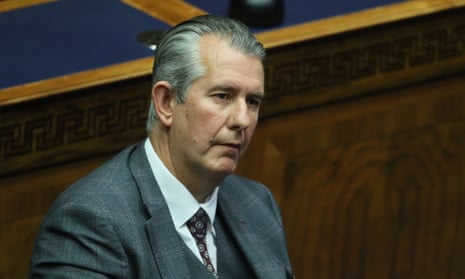Edwin Poots has resigned as leader of the Democratic Unionist party after just 21 days in the job. What has prompted the latest dramatic development in the leadership of Northern Ireland’s biggest party?
Why did Poots resign as DUP leader?
Poots quit on Thursday night because colleagues revolted over a deal he had agreed with Sinn Féin and the British government about Irish language legislation. The deal clinched Sinn Féin’s agreement to revive the stalled Stormont executive and to install Poots’ protege Paul Givan as first minister. But DUP assembly members and Westminster MPs considered it a concession too far.
Why is the legislation so controversial?
Unionists say they have nothing against the Irish language. Most parties, including the DUP, agreed to the long-promised legislation in a 2020 agreement called New Decade, New Approach. It would create an Irish language commissioner and an office of identity and cultural expression, among other things. Many unionists say Sinn Féin has “weaponised” the issue to undermine British identity and that there are more urgent legislative priorities. And stung by the Irish Sea border, they are in no mood to be seen as ceding more ground to nationalists. But the legislation itself is not the immediate reason Poots fell.
So what toppled him?
Poots replaced Arlene Foster, ousted in an April putsch, on the promise of listening to party members who had felt sidelined by Foster’s circle. But he did not consult colleagues about the language deal. Worse, when they complained about it at a stormy meeting on Thursday morning he ignored them – he walked out while the MP Sammy Wilson was speaking – and nominated Givan as first minister. This rebooted the executive, with Michelle O’Neill of Sinn Féin renominated as deputy first minister, but a DUP backlash forced Poots to quit hours later.
Who will replace him?
The favourite is Sir Jeffrey Donaldson, the Lagan Valley MP who narrowly lost to Poots in the battle to succeed Foster. He has the support of Foster’s old guard and could win over the demoralised Paisleyite Free Presbyterian wing that had backed Poots. There is speculation that the party, drained by convulsions, will crown Donaldson rather than have another divisive contest. However, other potential candidates such as Sammy Wilson may bid for the leadership.
What awaits the new DUP leader?
Purgatory. The party is bitterly divided on ideology, policy and personalities, prompting defections and resignations. Erstwhile supporters say its blunders led to the post-Brexit Northern Ireland protocol and the Irish Sea border. Polls suggest that in the next assembly election it will haemorrhage votes to Traditional Unionist Voice, the Ulster Unionist party and Alliance, with Sinn Féin emerging as the biggest party and claiming the post of first minister.
Can the Stormont assembly and executive continue?
Yes, in theory, until the next assembly election slated for May 2022. Givan has lost his mentor and angered some colleagues with the manner of his elevation to first minister, but the DUP may leave him in place. Removing him would trigger another showdown with Sinn Féin over the Irish language and probably a snap election, which neither party wants.
But the DUP meltdown, which started with the coup against Foster in April, keeps leaking into the assembly and executive. So too does the loyalist marching season, which has fused with protests over the Irish Sea border.
An early election grows ever more likely. That might mop up the DUP’s internal mess but there is no guarantee Northern Ireland’s parties could then cobble together a new power-sharing government. Quite a time for a birthday: on 22 June it will be 100 years since the opening of the first Northern Ireland assembly.
